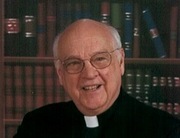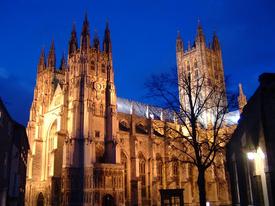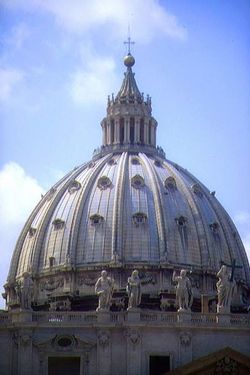
Zenit ran an interview the other about the recent development of possibilities of full communion of the Anglicans with Rome. The details of how this gesture of the Church has yet to be revealed by the Magisterium. Here is part of Karna Sawanson's interview with Monsignor William Stetson, secretary to the Ecclesiastical Delegate of the Congregation for the Doctrine of the Faith for the Pastoral Provision for former Episcopal priests. This part of the interview has to do with "personal ordinariates," the ecclesial structure proposed for living in the context of Anglican ways.
ZENIT: What is the aim of establishing the personal ordinariates? Why was the pastoral provision not sufficient?
Msgr. Stetson: The pastoral provision is merely an administrative process for preparing married, former Episcopal priests to be ordained as Catholic priests at the request of diocesan bishops. The new ordinariate will provide a canonical structure similar to a diocese for the pastoral care of lay faithful who convert from the Episcopal church.
ZENIT: This canonical structure seems to respond directly to a petition made two years ago by the Traditional Anglican Communion, which has about 400,000 members worldwide. Do you see many or most of these members entering into communion with the Catholic Church through the personal ordinariate?

Msgr. Stetson: The Traditional Anglican Communion is in reality a confederation of so-called dioceses located in many different countries; it is made up of priests and lay people and bishops. The Traditional Anglican Communion as such has never been part of the Anglican Communion under the Archbishop of Canterbury. What will happen to the dioceses in particular countries will depend on the decisions reached by the Catholic hierarchy in the respective countries together with the Congregation for the Doctrine of the Faith. Their numbers are greater in Africa and Asia.
ZENIT: What will the process look like for Anglicans, especially priests and bishops, entering the Church through the ordinariate?
Msgr. Stetson: The Apostolic Constitution allowing for the creation of ordinariates in each country has not yet been issued. For this reason we do not know the nature of the process. I would anticipate that it will be similar to that used for the last 27 years by the Pastoral Provision here in the United States, and its counterpart in England (that did not, however, provide for parishes and liturgy, as in the United States.)
ZENIT: The Vatican announcement provided for the possibility of an Anglican ordinariate having seminarians, who are to be prepared alongside Catholic seminarians, "though the ordinariate may establish a house of formation to address the particular needs of formation in the Anglican patrimony." Would this include the possibility of marriage for these Anglican seminarians?
Msgr. Stetson: The specifics have not yet been made known on this question. At the very least I would assume that the seminarians would have to be both married and studying in an Anglican seminary at the time they sought to enter into full communion, and then continue studying for the priesthood in a Catholic seminary. They would have to be dispensed from the norm of celibacy on a case-by-case basis by the Holy See. Future seminarians would have to be celibate.
ZENIT: What other traditions will the Anglicans retain when they enter the Catholic Church by way of the personal ordinariate?

Msgr. Stetson: Small parishes that allow for greater cohesion together. A rich tradition of liturgical expression (language, music, vestments, space, etc.) in English, dating back to the 16th century. This would also include a great tradition of the use of sacred Scripture in preaching, love for the Fathers of the Church and theological expression beyond that of Roman Catholic scholasticism.
ZENIT: Why is the Vatican able to offer this concession only to Anglicans, and not Lutherans, Presbyterians, etc., who would like to enter the Church?
Msgr. Stetson: Anglicans have always enjoyed a
special place in Roman Catholic attitudes toward the rupture of Christian unity
in the West after the 16th century. The Church of England sought to retain many
elements of the Catholic Church while at the same time being Protestant. The
Church of England maintained a greater unity within itself and thus could be
dealt with as a single entity in conversations with Rome.


Leave a comment